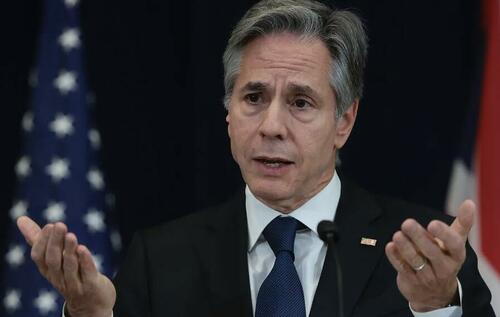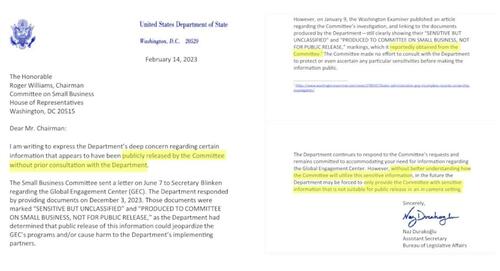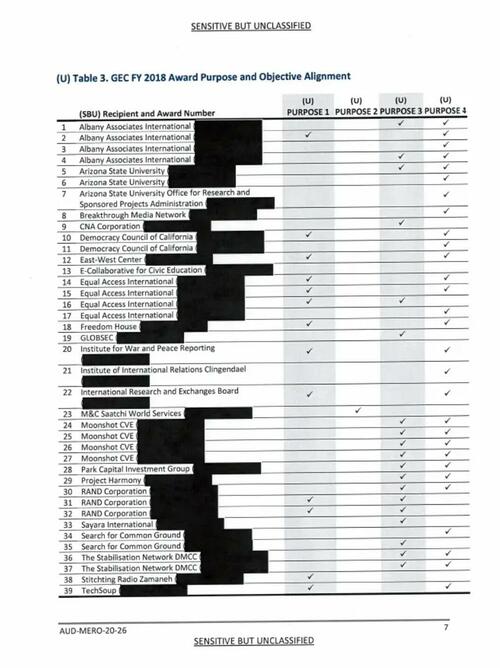Authored by Matt Taibbi via Racket News,
A year after its censorship programs were exposed, the Global Engagement Center still insists the public has no right to know how it's spending taxpayer money...
The State Department is so unhappy a newspaper published details about where it’s been spending your taxes, it’s threatened to only show a congressional committee its records in camera until it gets a “better understanding of how the Committee will utilize this sensitive information.” Essentially, Tony Blinken is threatening to take his transparency ball home unless details about what censorship programs he’s sponsoring stop appearing in papers like the Washington Examiner:
The State Department tells Congress, which controls its funding, that it will only disclose where it spent our money “in camera”
A year ago the Examiner published “Disinformation, Inc.”, a series by investigative reporter Gabe Kaminsky describing how the State Department was backing a UK-based agency that creates digital blacklists for disfavored media outlets. Your taxes helped fund the Global Disinformation Index, or GDI, which proudly touts among its services an Orwellian horror called the Dynamic Exclusion List, a digital time-out corner where at least 2,000 websites were put on blast as unsuitable for advertising, “thus disrupting the ad-funded disinformation business model.”
The culprit was the Global Engagement Center, a little-known State Department entity created in Barack Obama’s last year in office and a surprise focus of Twitter Files reporting. The GEC grew out of a counter-terrorism agency called the CSCC and has a mission to “counter” any messaging, foreign or domestic as it turns out, that they see as “undermining or influencing the policies, security, or stability of the United States.” The GEC-funded GDI rated ten conservative sites as most “risky” and put the Examiner on its “exclusion” list, while its ten sites rated at the “lowest level of disinformation” included Buzzfeed, which famously published the Steele Dossier knowing it contained errors and is now out of business.
In an effort to find out what other ventures GEC was funding — an absurd 36 of 39 2018 contractors were redacted even in an Inspector General’s report — the House Small Business Committee wrote the State Department last June asking for basic information about where the public’s money was being spent. State and GEC stalled until December 3 of last year, when it finally produced a partial list of recipients. Although House Republicans asked for an “unredacted list of all GEC grant recipients and associated award numbers” from 2019 through the current year, the list the Committee received was missing “dozens” of contractors, including some listed on USASpending.com.
The Examiner and Kaminsky subsequently wrote an article slamming GEC for sending “incomplete” records of the censorship investigation, in the process including links to a “snippet” of the GEC’s contractors:
In response to the outrage of this disclosure, the State Department sent its letter threatening in camera sessions until it gets a better “understanding” of how the Committee will use its “sensitive” information. That’s Beltway-ese for “We wouldn’t mind knowing the Examiner’s sources.”
About that: the State letter wrote that the Examiner’s records were “reportedly obtained from the Committee,” and included a footnote and a link to a Kaminsky story, implying that the Examiner reported that it got the records from the Committee. But the paper said nothing about the source of the documents, which as anyone who’s ever covered these types of stories knows, could have come from any number of places. It’s a small but revealing detail about current petulance levels at State.
“Anti-disinformation” work is not exactly hypersonic missile construction. There’s no legitimate reason for it to be kept from the public, especially since it’s increasingly clear its programs target American media companies and American media consumers, seemingly in violation of the State Department’s mission. The requested information is also not classified, making the delays and tantrums more ridiculous.
There are simply too many agencies that have adopted the attitude that the entire federal government is one giant intelligence service, entitled to secret budgeting and an oversight-free existence. They need pushback on this score and have at last started to get it. Thanks in significant part to the Examiner as well as lawsuits by The Federalist, Daily Wire, and Consortium News, the latest National Defense Authorization Act included for the first time a provision banning the Pentagon from using “any advertiser for recruitment that uses biased censorship entities like NewsGuard and GDI,” as a congressional spokesperson put it in December. We’ll see how it pans out, but congress withholding money for domestic spy programs is at least a possible solution, now in play.
Perhaps it’s time for the State Department to receive a similar wake-up call. If GEC wants to put conditions on disclosure, can we put conditions on paying taxes? SMH, SMH…



